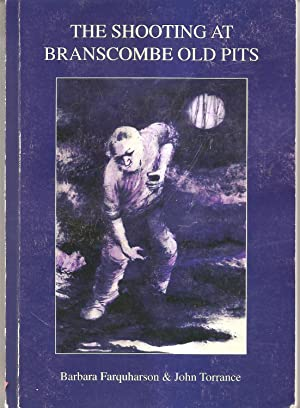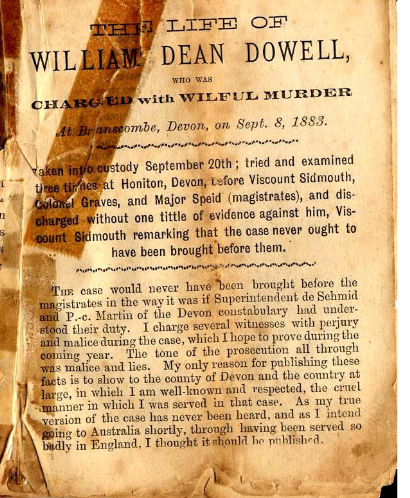Mike Guilfoyle, vice-chair of the Friends of Brockley and Ladywell Cemeteries, delves into the case of William Dean Dowell who was accused of shooting a 70 year old farm labourer near Branscombe, Devon. He was never sent to trial – and the murder remained unsolved.

By Barbara Farquharson and John Torrance , Cory Lyons ( illustrator)
During the recent lockdown I was lazily soaking up some past episodes of Inspector Morse on TV and pondered if our eponymous detective might have helped to solve a murder mystery with a local connection dating from 1883?
William Dean Dowell, a carpenter born in 1852, was accused of shooting John Perryman, who was a 70 year old farm labourer and superintendent of a Wesleyan Sunday School, as he walked home from harvesting on a moonlit night on the 8th September 1883 near the village of Branscombe, Devon.
The finger of suspicion fell on William and two others, Amos French and Eliza Williams (William’s sister) as accessories to the murder. The motive put forward to suspect the trio being the guilty parties was that they harboured a grievance against a David Pyle, and the fatal shooting had been a tragic case of mistaken identity.
But at their first appearance at Honiton police (magistrates) court before a crowded and eagerly awaited hearing the prisoners vehemently protested their innocence,. The magistrates retired to make their decision as to whether to commit the case to the assizes court for trial.
After brief deliberation , the chairman of the bench, Colonel Graves, announced to loud applause that “the bench are of the opinion that the evidence does not connect the prisoners, and declines to commit them, they are therefore discharged”.

It appears that very little effort was then expended on trying to find the real culprit(s) and the atmosphere in the village became poisonous. William, who had previously enjoyed a rising and respected reputation in the locality as a self made man with strong liberal principles, was forced to move away.
Having felt poorly served by the local justice system, in which he accused members of the Devon Constabulary of giving credence to several ‘witnesses’ motivated by malice against him and willing to perjure themselves in court.
William later penned a 32 page pamphlet, which was published by his trade union, giving a vivid account of events surrounding the court case and his reasons for leaving Branscombe to settle in London.

It was entitled: THE LIFE OF WILLIAM DEAN DOWELL who was CHARGED with WILFUL MURDER.
Only a few battered copies of William Dowell’s apologia still survive- It ends with a telling quote from William Shakespeare’s, Othello :
‘But he who robs from me my good name, Robs me of that which not enriches him, And makes me poor indeed
Having moved to London, William Dean Dowell lived for many years at Branscombe Villa, Rockbourne road, Forest Hill before his death in 1930 aged 78 years.
His only son, also named William Dean Dowell is remembered on the Arras Memorial, Northern France, having been killed in action in 1917 aged 19 whilst serving with the Machine Gun Corps.
William Snr. now lies interred in Ladywell cemetery with other family members. The mystery of who killed John Perryman remains unsolved to this day!
